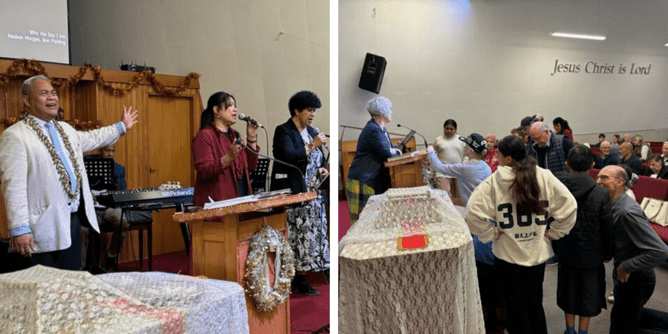By Mark Grace, CCCNZ Ambassador
Ephesians 2:14
Ko ia hoki to tatou maunga rongo, nana i mea nga mea e rua kia kotahi, whakahoroa iho e ia te patu e arai ana i waenga;
Auā o Keriso lava ia na ‘aumaia le filemū ia i tatou, ‘ina ‘ua fa‘atasia e ia tagata Iutaia ma tagata o Nu‘u ‘ese e fai ma tagata e tasi. Na tu‘uina atu e ia lona lava tino e lepetia ai i lalo le pa o le feitaga‘i sa vaeluaina ai i latou.
For he himself is our peace, who has made the two groups one and has destroyed the barrier, the dividing wall of hostility.
There couldn’t be more that separated Gentiles and Jews.
Most importantly, there was the theological gulf. Gentiles worshipped a pantheon of non-existent deities. Jewish people worshipped the God of Israel revealed in their Scriptures.
There was the cultural chasm. Jewish life was filled with unique ceremonies and customs. Gentile life possessed its own cultural idiosyncrasies.
And then there was the ethnic enmity between Gentiles and Jews that stretched from small-scale disdain to cries for the other's destruction. Racial hatred between Gentiles and Jews has been, at different times throughout history, revolting.
Any racial, cultural, and theological divide has been destroyed at the cross. At the cross Christ himself destroyed all the barriers that separate Jew and Gentile (and, by implication, Gentile and Gentile.)
At the cross, Christ won for himself one people. His own people, distinguished not by racial or cultural differences but by the fact that they belong to him. They are united by Christ's love for them, expressed by his taking the punishment for their sin upon himself.
Therefore, any sense of theological, cultural, and racial superiority and specialness is destroyed at the cross. Christ changes our understanding of race.
Last weekend I had the privilege of being at Tītahi Bay Community Church in Wellington. It was a delight to worship Jesus in a multi-lingual, multi-cultural, intergenerational service filled with people from all walks of life.
I was welcomed in English and several Pacific languages, and I loved singing in Te Reo Māori and English. I enjoyed sharing hongi and hugs. I appreciated the years of ongoing commitment to mutual sacrifice and service towards each other as this church whānau actively lives out the Way of the Cross.
What I saw at Tītahi Bay is that Christ is at work through the reconciling power of his death.
Christ is our peace; and through him we have peace with one another.




